Here’s where the Democratic debate candidates stand on healthcare

- Share via
There’s a reason why the Democratic debates have spent so much time on healthcare — it has emerged as one of the most contentious battles in the presidential primary.
“Medicare for all,” and how candidates line up for or against it, is the biggest healthcare flashpoint, a proxy war for the broader philosophical fight between the progressive and moderate wings of the Democratic Party. But there’s a lot more to healthcare policy than Medicare for all.
The candidates who will be on the debate stage Thursday have delved into some of the other major issues pertaining to Americans’ well-being, including combating the opioid crisis, expanding mental health treatment and addressing the country’s poor maternal health outcomes.
All the candidates support abortion rights and back codifying into federal law the 1973 Supreme Court ruling in Roe vs. Wade that legalized the procedure nationwide. They also support repealing the Hyde Amendment, which largely prohibits federal dollars from paying for abortions.
Here’s a look at what the seven candidates scheduled to appear in the December debate are proposing:
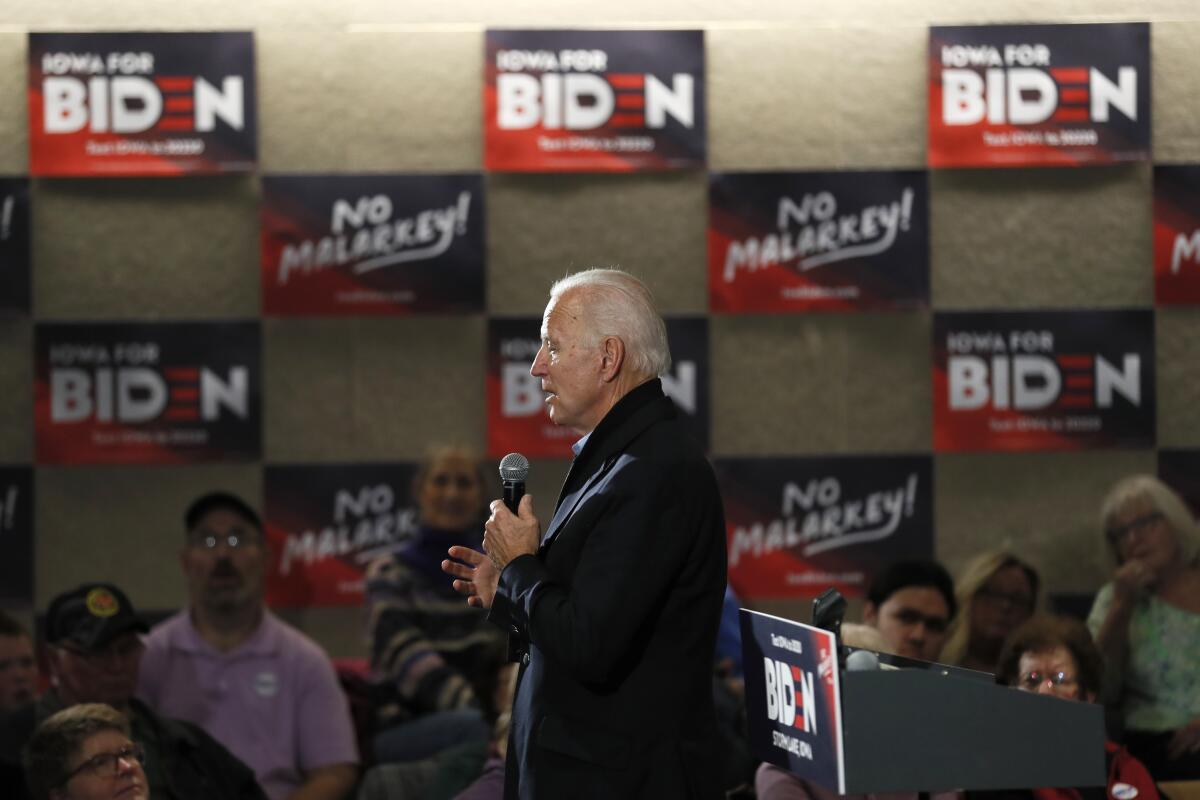
Joe Biden
Joe Biden has been a vocal critic of Medicare for all, arguing that it would be too costly.
Instead, the former vice president proposes building on the Affordable Care Act by offering a public health insurance option that would be financed primarily through higher taxes on capital gains. People could also stay on their employer-based coverage or buy into a private plan on their own.
Biden’s plan would increase tax credits to ensure no one is spending more than 8.5% of their income on insurance. To lower drug prices, he would allow the federal government to negotiate with pharmaceutical companies, and he wants to limit launch prices for drugs that face no competition and to limit price increases for all brand and biotech drugs and high-priced generics to inflation. He would allow consumers to import drugs from other countries, as long as they are certified safe, and would terminate drug companies’ tax breaks for marketing costs.
~~~
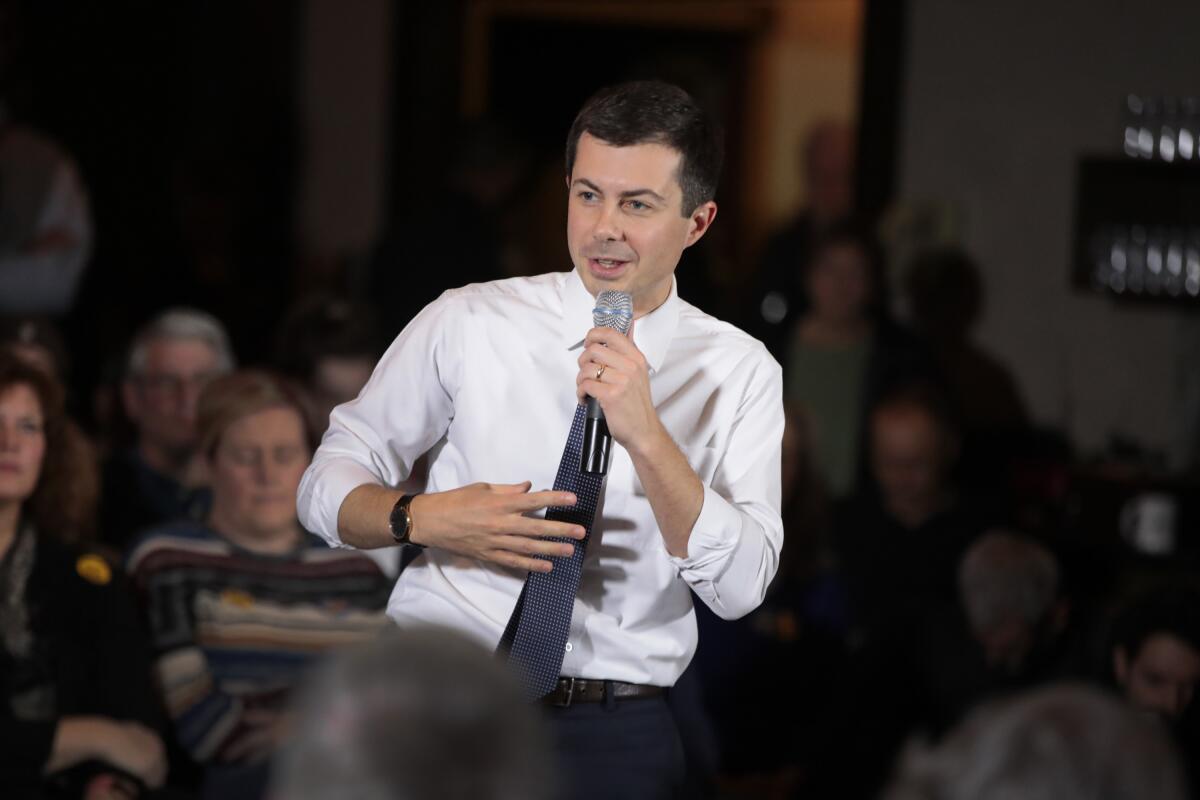
Pete Buttigieg
Pete Buttigieg proposes “Medicare for all who want it,” which is effectively a government-run public option to compete with private insurance companies.
The South Bend, Ind., mayor proposes expanding subsidies to make premiums more affordable and would cap them at 8.5% of a person’s income. He would also cap out-of-pocket drug spending for those on the public option at $250 per month and $200 a month for seniors on Medicare.
He wants the federal government to negotiate drug prices and would use the government’s power to acquire intellectual property rights from drug companies that excessively price their medications. He says he would penalize pharmaceutical companies that raise drug prices faster than inflation.
Buttigieg proposes a 10-year, $100-billion grant program to help communities that have been affected by the opioid epidemic, and he supports state-level lawsuits against pharmaceutical companies for their role in the crisis. He proposes ramping up the federal government’s monitoring of the prescription of controlled substances and making naloxone, the overdose reversal drug, and other medication-assisted treatments for addiction more widely available.
~~~
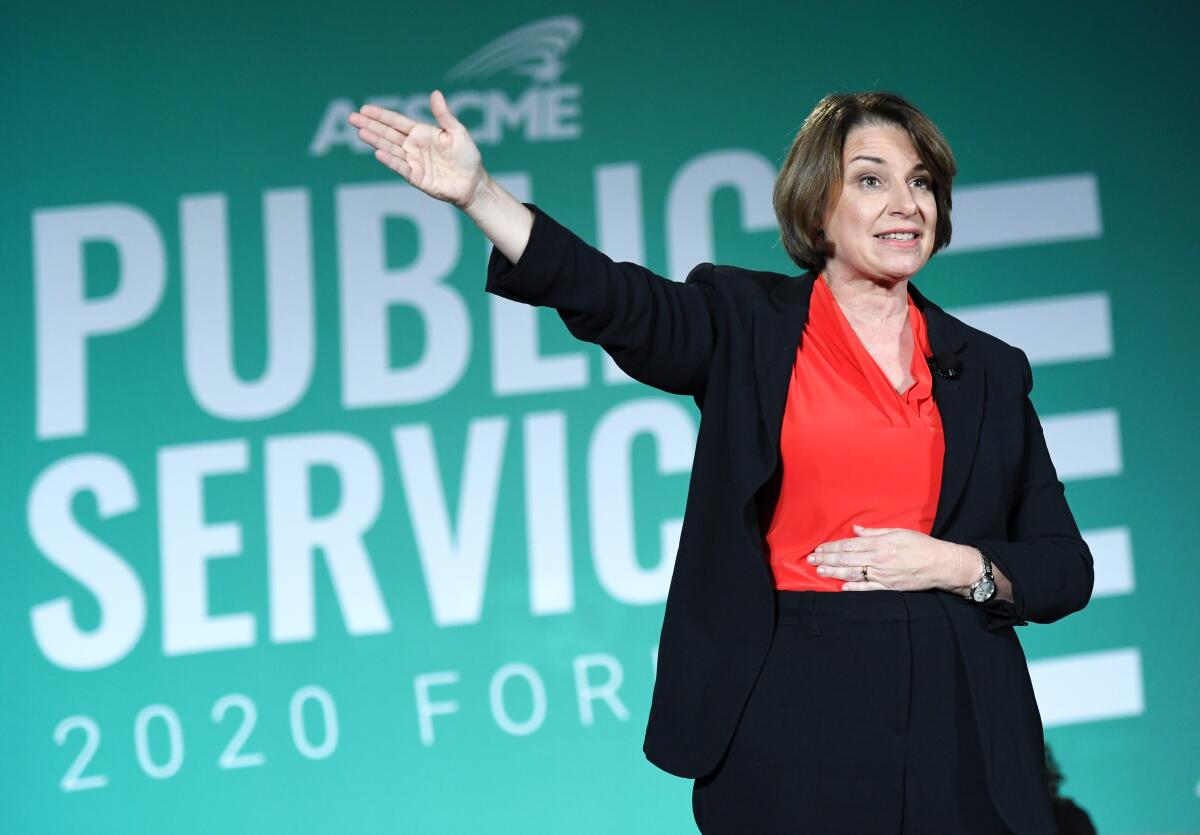
Amy Klobuchar
Minnesota Sen. Amy Klobuchar emphasizes building on the Affordable Care Act instead of a more sweeping overhaul like Medicare for all.
She proposes a nonprofit public option that would allow people to buy into Medicaid or Medicare while still maintaining a role for private insurers. Klobuchar wants to expand premium subsidies under the ACA and provide discounts on patients’ out-of-pocket costs such as copays and deductibles.
She aims to reduce drug costs for seniors by letting the government negotiate prescription prices through Medicare Part D and allowing the personal importation of cheaper medicine from Canada.
Klobuchar, who often speaks about her father’s struggle with alcoholism, has put particular emphasis on addiction treatment. She proposes a 2-cent fee on each milligram of active opioid ingredient in a prescription pain pill, paid for by the manufacturer or importer of the drug. The money would be used to provide and expand access to treatment for substance abuse and mental health issues. She would craft a Master Settlement Agreement with opioid manufacturers to give money directly to states to cover the cost of addiction treatment and social services.
She has also called for expanding access and increasing beds for mental health, alcohol and drug treatment services.
~~~
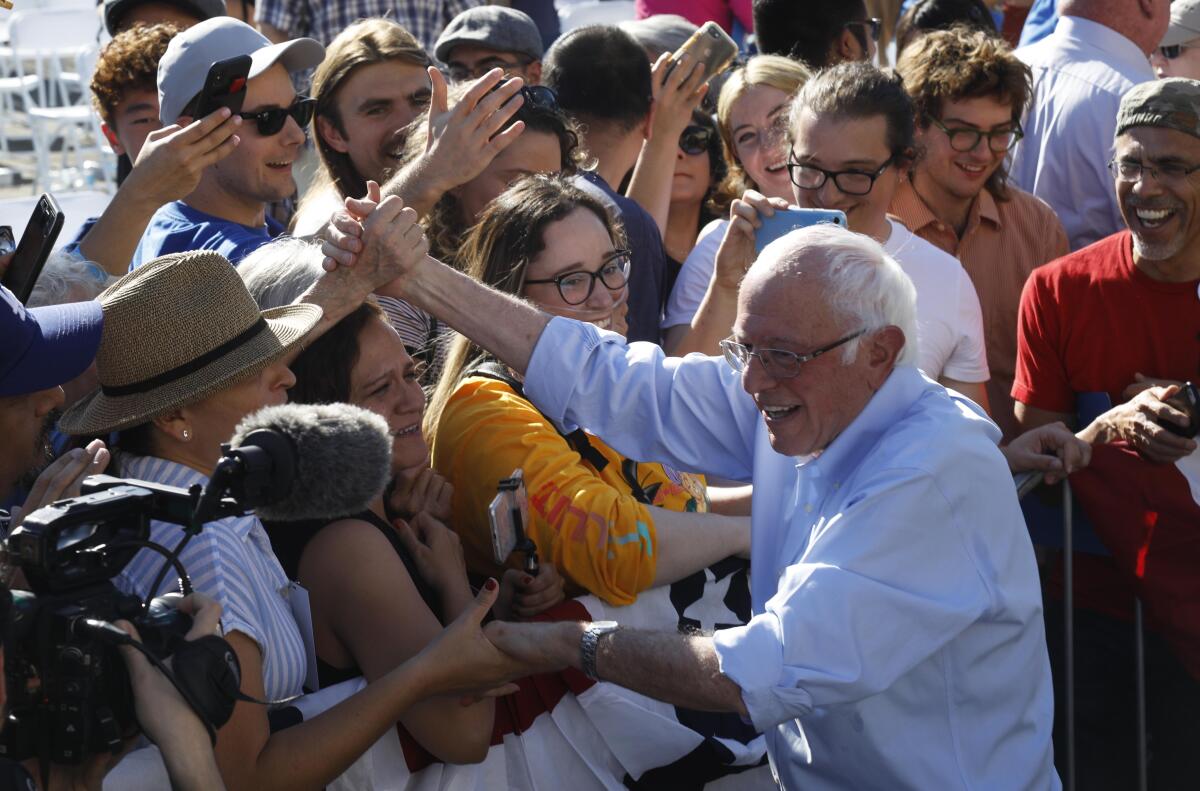
Bernie Sanders
Vermont Sen. Bernie Sanders is the candidate most closely associated with Medicare for all. After all, as he likes to say, he “wrote the damn bill!”
Sanders’ plan would do away with private insurance companies. Instead, his proposal would cover all residents, including those without legal status, under a government-run plan that would have no out-of-pocket costs for consumers except for prescription drugs. He has proposed financing the plan through a payroll tax on employers, higher income taxes on families making more than $29,000 per year and higher taxes on the wealthy.
The government would negotiate with drugmakers over prescription prices, and he would also allow patients, pharmacists and wholesalers to buy from Canada and other industrialized countries. To reduce costs, the Vermont senator wants to peg medication prices to the median drug price in Canada, the United Kingdom, France, Germany and Japan.
He has taken a tough line on drug manufacturers, introducing legislation to prohibit illegal marketing and distribution of opioids and calling for criminal liability for drug company executives and for manufacturers to reimburse the country for the negative effects of their products.
To address shortages of healthcare providers, especially in the mental health fields, he wants to increase funding for the National Health Service Corps.
~~~

Tom Steyer
Tom Steyer does not support Medicare for all.
Instead, the Bay Area-based billionaire has called for the creation of a government-run public option to compete with private insurance plans. Those who would qualify for Medicaid would be offered fully subsidized enrollment in the public option, which would also be open to people living in the country illegally. He would expand subsidies offered under the Affordable Care Act.
Steyer would have Medicare and the public option negotiate drug prices with manufacturers, and he would set a price cap and benchmark the price of drugs against international standards. He would also allow Americans to purchase drugs approved by the Food and Drug Administration from across international borders.
Steyer has called for spending $100 billion on expanding mental healthcare and $75 billion over 10 years specifically to address the opioid crisis. His administration would also encourage prescribers to look to other therapies before turning to opioids and other addictive medications.
~~~
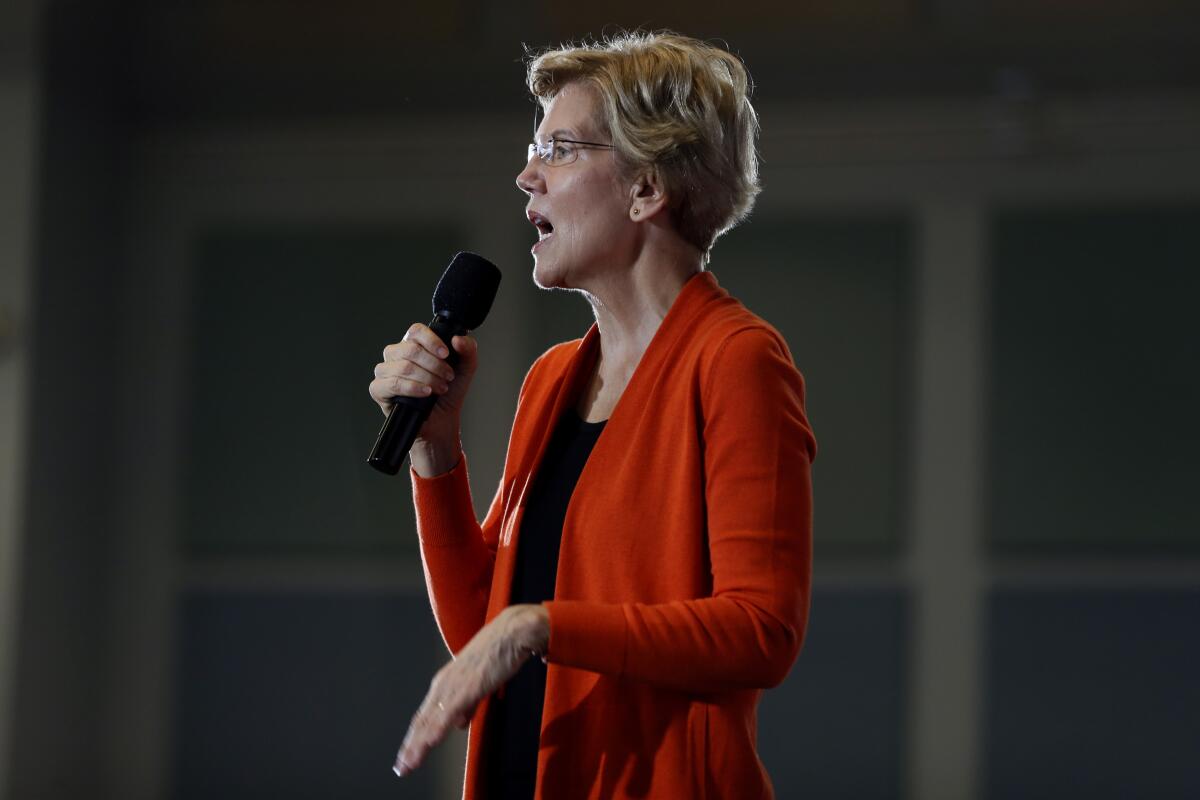
Elizabeth Warren
Elizabeth Warren supports Medicare for all, but unlike Sanders, she has called for a longer transition to a new government-run healthcare system.
The Massachusetts senator said she would aim to pass a Medicare public option, which would automatically cover all children and low-income Americans, within the first 100 days of her presidency. Other people could opt into the program in its early stages or stay with private insurance companies. In her third year, she would pursue a full Medicare-for-all plan, which would cover everyone in the country with no out-of-pocket costs. The complete plan would cost $20 trillion, funded by new taxes on the rich and contributions from employers, her blueprint says.
Warren has also outlined a slew of executive actions she would take in her first months as president, including reversing Trump administration efforts to undermine the Affordable Care Act and using existing government powers to revoke a medication’s patent if there is public need, which would pave the way for lower-priced versions of that drug.
Warren would allow the federal government to manufacture generic drugs in certain circumstances, such as when there is a drug shortage or when no company is manufacturing the drug, and she supports allowing Medicare to negotiate with companies to lower drug prices.
To deal with the opioid crisis, she has proposed a $100-billion plan that includes targeted funds for areas with the highest levels of overdoses and expanded access to naloxone, the anti-overdose drug. She would impose criminal penalties on executives of companies if they’re found to have acted negligently in distributing drugs.
Warren would address the country’s high maternal mortality rate by tracking health outcomes for mothers and infants at hospitals and would give bonuses or penalties based on the results.
~~~

Andrew Yang
Andrew Yang, a New York entrepreneur, says he supports the “spirit” of Medicare for all but does not think that immediately eliminating private insurance is realistic.
His plan focuses on ways to bring healthcare costs down. He supports shifting doctors to a flat salary instead of a fee-for-service model.
In addition to having the government negotiate drug costs, he wants to use the average cost of medications in other countries to set a baseline for prices and has called for public manufacturing facilities to make generic drugs. If a company is pricing a medication too high, he backs granting a license to produce that drug to a company that would charge less.
He backs expanded use of technologies such as telehealth and artificial intelligence to boost coverage, and wants to create a single telemedicine license that would allow providers to see patients in all 50 states.
Yang would direct $20 billion per year toward addiction treatment and rehabilitation and wants to impose a new tax on opiate manufacturers to pay for treatment. He would clamp down on the prescription rate by requiring all opioid prescriptions to come from hospitals instead of individual offices or practices.
Where the Democratic candidates stand ...
More to Read
Get the L.A. Times Politics newsletter
Deeply reported insights into legislation, politics and policy from Sacramento, Washington and beyond. In your inbox twice per week.
You may occasionally receive promotional content from the Los Angeles Times.















